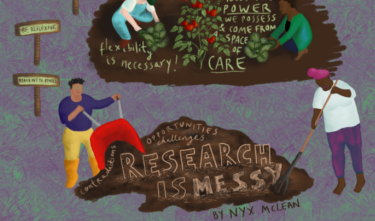Beyond doctors and engineers: Exploring careers in pure science and the challenges of being a scientist

When it comes to choosing a professional degree for a secure career, in India many people still prefer taking up a doctor or engineering course over studying pure science. However, did you know about the many career options one can have after studying pure sciences? In this article, Venkat Koushik Pulla, who is a trained scientist and works as a Senior Manager Commercial Marketing at Merck, tells us more about the perks and challenges of being a scientist, and more.Excerpts:
1. As a trained scientist, what are the career options in pure science that you think people should know about?
There are many aspects to explore in pure science, and it’s all about discovering your interests. These days, having a multidisciplinary skill set is critical for career advancement. Existing skills and technologies are becoming obsolete, so constant upgrading is essential no matter your field. With AI taking over monotonous tasks, creativity and unique perspectives are key to standing out.
Career options in pure science include:
Research Scientist
This is perhaps one of the most obvious choice for pure science graduates. Research scientists work in labs across academia, government research institutions, and private industries such as pharmaceuticals, biotechnology, and materials science. They conduct experiments, analyze data, and contribute to scientific discoveries.
Data Scientist
With the rise of big data and analytics, there’s a growing demand for data scientists who can apply statistical analysis and computational techniques to interpret complex data sets. Pure science graduates often have strong analytical skills and a solid foundation in mathematics and statistics, making them well-suited for this role.
Science Communication
Scientists who can effectively communicate research findings are employed as scientific writers by pharma companies. They bridge the gap between scientific research and the public through writing, journalism, and multimedia. . Science journalists play a vital role in bridging the gap between scientific research and the general public, informing and educating audiences about important discoveries and developments.
Patent Examiner
Patent examiners assess whether inventions meet the requirements for patentability and play a key role in shaping innovation. A background in pure science provides the necessary technical expertise for this profession.
Techno-commercial Roles
Trained scientists are very important for life science organizations to promote, demonstrate technical products. Who else could be better to position the products in a right way – as they would have used similar products during their research days. They have the advantage of meeting different scientists and understand their challenges, and support them to give suitable solutions.
Science Education and Outreach
Pure science graduates can pursue careers as science educators in schools, museums, and educational institutions, inspiring and mentoring future scientists.
Clinical Research Associate (CRA)
In the pharmaceutical and biotechnology industries, CRAs oversee clinical trials to ensure compliance with protocols and regulatory requirements. A background in pure science provides the foundational knowledge necessary to understand the scientific principles underlying clinical research.
Quality Assurance/Quality Control (QA/QC) Specialist
QA/QC specialists ensure that products, processes, and systems meet quality standards and regulatory requirements. In industries such as pharmaceuticals and biotechnology, they play a crucial role in maintaining product quality and safety.
Entrepreneurship and Innovation:
Many pure science graduates have entrepreneurial aspirations and the ability to innovate. The government supports their aspirations with initial seed grants, allowing them to start their own companies, develop new technologies, or collaborate with industry partners.
It’s important to emphasize that studying pure science not only opens doors to these specific career paths but also equips individuals with critical thinking, problem-solving, and analytical skills that are highly valued across various industries. As the world continues to advance technologically and scientifically, the demand for skilled pure science graduates will only continue to grow, making it a promising and rewarding career choice.
2. What are the challenges of becoming a scientist?
Becoming a scientist is a rewarding pursuit but also comes with several challenges that people aspiring to be scientists should be aware of:
Education and Training
Becoming a scientist typically involves obtaining higher education degrees, such as a bachelor’s, master’s, and often a PhD. This requires dedication, perseverance, and a strong academic foundation.
Competitive Environment
Scientific research is highly competitive, with challenges in securing funding, grants, and research positions due to limited resources and a high number of qualified applicants.
Time and Patience
Scientific research often requires long hours of experimentation, data analysis, and writing. Progress can be slow, with breakthroughs taking years or even decades to achieve.
Funding and Resources
Conducting research requires funding for equipment, materials, and sometimes personnel. Securing adequate funding can be a constant challenge, particularly for early-career researchers.
Publishing and Peer Review
Publishing research in reputable scientific journals is essential for career advancement and recognition. The peer review process can be rigorous and sometimes subjective, requiring persistence and resilience.
Balancing Innovation and Reproducibility
Striking a balance between pursuing innovative research and ensuring reproducibility of results is crucial. Maintaining scientific integrity and rigor is essential but can be challenging in a competitive environment.
Career Instability
Career paths in science can be less predictable compared to other professions. Short-term contracts, postdoctoral positions, and the need to relocate for research opportunities are common, leading to uncertainty and instability.
Work-Life Balance
The demanding nature of scientific research can impact work-life balance. Long hours, deadlines, and the pressure to publish can lead to stress and burnout if not managed effectively.
Despite these challenges, a career in science offers the opportunity to make significant contributions to knowledge, innovation, and societal progress. Overcoming these challenges requires resilience, passion for discovery, and a commitment to the scientific process.
3. Being a trained scientist, you work as a Commercial Marketing Manager. Please elaborate your job profile.
As a Commercial Marketing Manager at Merck, my job revolves around promoting and commercializing scientific innovations and products. Here are some key roles and responsibilities:
Product Positioning and Branding:
Developing strategies to position our products effectively in the market. Creating compelling messaging and branding initiatives that resonate with our target audience.
Marketing Campaigns:
Planning and executing marketing campaigns across various channels such as digital marketing and conferences. Visiting customers to understand their needs and market trends. Collaborating with creative teams to develop promotional materials and run events.
Data Analysis:
Analyzing data to assess the effectiveness of marketing campaigns. Identifying workflow gaps and developing targeted campaigns.
Sales Support:
Working closely with the sales team to provide effective tools, materials, and training to support their efforts in driving sales.
Customer Engagement:
Building relationships with key opinion leaders through webinars, roadshows, and conferences.
Market Development:
Identifying new market opportunities and potential applications for existing products. Developing strategies to expand our market presence and drive growth.
Overall, my role bridges the gap between scientific innovation and commercial success, ensuring that our products meet customer needs and achieve business objectives.
4. What are the challenges of your profession and how do you deal with them?
As a Commercial Marketing Manager responsible for driving segment marketing, the role presents several challenges that require adept handling to ensure success. Here are some of the key challenges and strategies to effectively deal with them:
Customer Engagement:
Engaging customers meaningfully amidst increasing digital noise and competition is a constant challenge. Prioritize personalized, targeted marketing efforts that resonate with specific needs and preferences.
Data Management:
Managing and leveraging data effectively is crucial. Implement robust data management systems, ensure data privacy and security, and utilize analytics to derive actionable insights.
Cross-Functional Collaboration:
Aligning marketing strategies with other departments requires strong collaboration. Build open communication channels and foster a collaborative culture within the organization.
Measuring ROI:
Demonstrating the impact and ROI of marketing initiatives can be challenging. Establish clear KPIs, leverage marketing analytics tools, and continuously analyze campaign performance.
Adapting to Technological Advances:
Keeping up with rapid technological advancements and integrating new marketing tools can be overwhelming. Invest in continuous learning, stay updated on industry trends, and embrace innovative marketing technologies.
5. How do you manage your work-life balance?
Maintaining a healthy work-life balance is essential for productivity and well-being. Here are some strategies:
Prioritization:
Set clear priorities and goals to focus on the most important tasks both at work and in personal life.
Time Management:
Use tools such as calendars, task lists, and prioritization techniques to allocate sufficient time for work and personal activities.
Boundaries:
Establish boundaries between work and personal life, such as setting specific work hours and avoiding work-related activities during personal time.
Self-Care:
Engage in activities that promote physical and mental well-being, such as exercise, hobbies, and spending time with loved ones.
6. How do you dealing with stress?
Managing stress effectively is key in a demanding role. Here’s how I manage stress:
Me Time:
I carve out “me time” whenever possible, such as during commutes, where I listen to podcasts and talks that ground me.
Voice Journaling:
I use voice journaling to summarize daily observations, helping me avoid overthinking about the past and future.
Mindfulness and Relaxation Techniques:
Practice mindfulness, deep breathing, or meditation to stay grounded and manage stress levels.
Physical Activity:
Regular exercise, whether it’s going to the gym, jogging, or yoga, helps reduce stress and boost overall well-being.
Time Management:
Effective time management minimizes stress by ensuring deadlines are met and tasks are tackled in a structured manner.
Seeking Support:
Talking to colleagues, mentors, or friends about challenges and seeking their advice can provide valuable support and reduce stress.
Taking Breaks:
Taking short breaks during the workday and longer vacations when possible helps prevent burnout and allows for rejuvenation.
1. As a trained scientist, what are the career options in pure science that you think people should know about?
There are many aspects to explore in pure science, and it’s all about discovering your interests. These days, having a multidisciplinary skill set is critical for career advancement. Existing skills and technologies are becoming obsolete, so constant upgrading is essential no matter your field. With AI taking over monotonous tasks, creativity and unique perspectives are key to standing out.
Career options in pure science include:
Research Scientist
This is perhaps one of the most obvious choice for pure science graduates. Research scientists work in labs across academia, government research institutions, and private industries such as pharmaceuticals, biotechnology, and materials science. They conduct experiments, analyze data, and contribute to scientific discoveries.
Data Scientist
With the rise of big data and analytics, there’s a growing demand for data scientists who can apply statistical analysis and computational techniques to interpret complex data sets. Pure science graduates often have strong analytical skills and a solid foundation in mathematics and statistics, making them well-suited for this role.
Science Communication
Scientists who can effectively communicate research findings are employed as scientific writers by pharma companies. They bridge the gap between scientific research and the public through writing, journalism, and multimedia. . Science journalists play a vital role in bridging the gap between scientific research and the general public, informing and educating audiences about important discoveries and developments.
Patent Examiner
Patent examiners assess whether inventions meet the requirements for patentability and play a key role in shaping innovation. A background in pure science provides the necessary technical expertise for this profession.
Techno-commercial Roles
Trained scientists are very important for life science organizations to promote, demonstrate technical products. Who else could be better to position the products in a right way – as they would have used similar products during their research days. They have the advantage of meeting different scientists and understand their challenges, and support them to give suitable solutions.
Science Education and Outreach
Pure science graduates can pursue careers as science educators in schools, museums, and educational institutions, inspiring and mentoring future scientists.
Clinical Research Associate (CRA)
In the pharmaceutical and biotechnology industries, CRAs oversee clinical trials to ensure compliance with protocols and regulatory requirements. A background in pure science provides the foundational knowledge necessary to understand the scientific principles underlying clinical research.
Quality Assurance/Quality Control (QA/QC) Specialist
QA/QC specialists ensure that products, processes, and systems meet quality standards and regulatory requirements. In industries such as pharmaceuticals and biotechnology, they play a crucial role in maintaining product quality and safety.
Entrepreneurship and Innovation:
Many pure science graduates have entrepreneurial aspirations and the ability to innovate. The government supports their aspirations with initial seed grants, allowing them to start their own companies, develop new technologies, or collaborate with industry partners.
It’s important to emphasize that studying pure science not only opens doors to these specific career paths but also equips individuals with critical thinking, problem-solving, and analytical skills that are highly valued across various industries. As the world continues to advance technologically and scientifically, the demand for skilled pure science graduates will only continue to grow, making it a promising and rewarding career choice.
2. What are the challenges of becoming a scientist?
Becoming a scientist is a rewarding pursuit but also comes with several challenges that people aspiring to be scientists should be aware of:
Education and Training
Becoming a scientist typically involves obtaining higher education degrees, such as a bachelor’s, master’s, and often a PhD. This requires dedication, perseverance, and a strong academic foundation.
Competitive Environment
Scientific research is highly competitive, with challenges in securing funding, grants, and research positions due to limited resources and a high number of qualified applicants.
Time and Patience
Scientific research often requires long hours of experimentation, data analysis, and writing. Progress can be slow, with breakthroughs taking years or even decades to achieve.
Funding and Resources
Conducting research requires funding for equipment, materials, and sometimes personnel. Securing adequate funding can be a constant challenge, particularly for early-career researchers.
Publishing and Peer Review
Publishing research in reputable scientific journals is essential for career advancement and recognition. The peer review process can be rigorous and sometimes subjective, requiring persistence and resilience.
Balancing Innovation and Reproducibility
Striking a balance between pursuing innovative research and ensuring reproducibility of results is crucial. Maintaining scientific integrity and rigor is essential but can be challenging in a competitive environment.
Career Instability
Career paths in science can be less predictable compared to other professions. Short-term contracts, postdoctoral positions, and the need to relocate for research opportunities are common, leading to uncertainty and instability.
Work-Life Balance
The demanding nature of scientific research can impact work-life balance. Long hours, deadlines, and the pressure to publish can lead to stress and burnout if not managed effectively.
Despite these challenges, a career in science offers the opportunity to make significant contributions to knowledge, innovation, and societal progress. Overcoming these challenges requires resilience, passion for discovery, and a commitment to the scientific process.
3. Being a trained scientist, you work as a Commercial Marketing Manager. Please elaborate your job profile.
As a Commercial Marketing Manager at Merck, my job revolves around promoting and commercializing scientific innovations and products. Here are some key roles and responsibilities:
Product Positioning and Branding:
Developing strategies to position our products effectively in the market. Creating compelling messaging and branding initiatives that resonate with our target audience.
Marketing Campaigns:
Planning and executing marketing campaigns across various channels such as digital marketing and conferences. Visiting customers to understand their needs and market trends. Collaborating with creative teams to develop promotional materials and run events.
Data Analysis:
Analyzing data to assess the effectiveness of marketing campaigns. Identifying workflow gaps and developing targeted campaigns.
Sales Support:
Working closely with the sales team to provide effective tools, materials, and training to support their efforts in driving sales.
Customer Engagement:
Building relationships with key opinion leaders through webinars, roadshows, and conferences.
Market Development:
Identifying new market opportunities and potential applications for existing products. Developing strategies to expand our market presence and drive growth.
Overall, my role bridges the gap between scientific innovation and commercial success, ensuring that our products meet customer needs and achieve business objectives.
4. What are the challenges of your profession and how do you deal with them?
As a Commercial Marketing Manager responsible for driving segment marketing, the role presents several challenges that require adept handling to ensure success. Here are some of the key challenges and strategies to effectively deal with them:
Customer Engagement:
Engaging customers meaningfully amidst increasing digital noise and competition is a constant challenge. Prioritize personalized, targeted marketing efforts that resonate with specific needs and preferences.
Data Management:
Managing and leveraging data effectively is crucial. Implement robust data management systems, ensure data privacy and security, and utilize analytics to derive actionable insights.
Cross-Functional Collaboration:
Aligning marketing strategies with other departments requires strong collaboration. Build open communication channels and foster a collaborative culture within the organization.
Measuring ROI:
Demonstrating the impact and ROI of marketing initiatives can be challenging. Establish clear KPIs, leverage marketing analytics tools, and continuously analyze campaign performance.
Adapting to Technological Advances:
Keeping up with rapid technological advancements and integrating new marketing tools can be overwhelming. Invest in continuous learning, stay updated on industry trends, and embrace innovative marketing technologies.
5. How do you manage your work-life balance?
Maintaining a healthy work-life balance is essential for productivity and well-being. Here are some strategies:
Prioritization:
Set clear priorities and goals to focus on the most important tasks both at work and in personal life.
Time Management:
Use tools such as calendars, task lists, and prioritization techniques to allocate sufficient time for work and personal activities.
Boundaries:
Establish boundaries between work and personal life, such as setting specific work hours and avoiding work-related activities during personal time.
Self-Care:
Engage in activities that promote physical and mental well-being, such as exercise, hobbies, and spending time with loved ones.
6. How do you dealing with stress?
Managing stress effectively is key in a demanding role. Here’s how I manage stress:
Me Time:
I carve out “me time” whenever possible, such as during commutes, where I listen to podcasts and talks that ground me.
Voice Journaling:
I use voice journaling to summarize daily observations, helping me avoid overthinking about the past and future.
Mindfulness and Relaxation Techniques:
Practice mindfulness, deep breathing, or meditation to stay grounded and manage stress levels.
Physical Activity:
Regular exercise, whether it’s going to the gym, jogging, or yoga, helps reduce stress and boost overall well-being.
Time Management:
Effective time management minimizes stress by ensuring deadlines are met and tasks are tackled in a structured manner.
Seeking Support:
Talking to colleagues, mentors, or friends about challenges and seeking their advice can provide valuable support and reduce stress.
Taking Breaks:
Taking short breaks during the workday and longer vacations when possible helps prevent burnout and allows for rejuvenation.
Natasa Stankovic Speaks on Parenting Following Her Split with Cricketer Hardik Pandya
link







